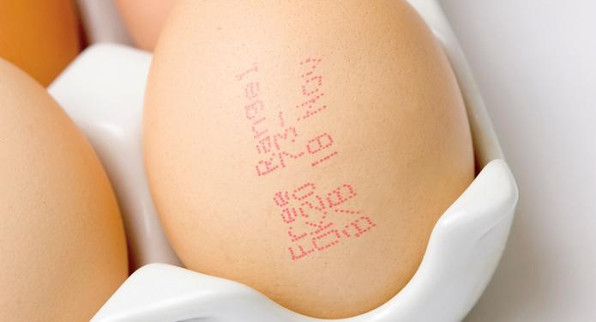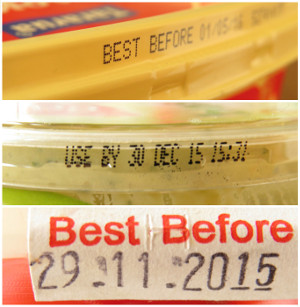A new study on food waste by the Univésité du Quebec à Montréal (UQAM) postulates that less food would be wasted if more people knew what the ‘Best Before’ date on their food purchases actually means. And supermarkets are complicit in this needless waste in their stocking policies…
 All that’s edible now gets a Best Before date: Even Eggs get ink-jetted as they pass
All that’s edible now gets a Best Before date: Even Eggs get ink-jetted as they pass
along the packaging line. But the Best Before date on a food item
does not mean it’s not safe to consume after that…
Study Co-authors Dr. René Audet and Dr. Éliane Brisebois say consumers may be taking ‘Best Before’ dates on their food purchases too seriously, too literally. They polled more than 1,000 Quebec consumers and interviewed stock managers at 14 supermarkets during their research.
What they found…
They found that those in charge of feeding their households fall into three categories, logistically: Concilliators (58 %) Planners (25 %) and Improvisors (17%).
Planners appear to be the least wasteful shoppers and plan ahead on the recipes and leftover meals they’ll make over the coming week.
Improvisors apparently don’t go to the supermarket with any firm idea of what they’ll be feeding their families over the coming week. The study nails them are prime targets for ‘2 for 1’ and other supposed deals. They waste the most food.
Concilliators are aware of the food waste problem, but lack concrete knowledge or strategies to make their supermarket buying more responsible.
Be a Planner…
Take some time to plan your menus for the coming week before you go shopping. Make a shopping list and stick to it. Don’t get sucked into ‘2 for 1’s or other multiple-item purchase deals. (The latter are often not as good a deal as they appear to be.)
Abuse of ‘Best Before’ dates…
One of the biggest problems in the field-to-fork food chain is the misinterpretation of ‘Best Before’ dates. And it’s not only consumers who are doing it.
Supermarket stock managers told the study’s authors that they often remove foods from sale at their ‘Best Before’ dates even though they are perfectly alright to eat. Some products are even removed from sales even before their ‘Best Before’ dates. Stock managers say consumers, who are unaware of the true meaning of ‘Best Before’ dates often reach to the back of the cooler to get products with the farthest-out best before dates. The older stuff at the front of the case doesn’t sell and has to be tossed, anyway, in the end.
Another dimension of the waste problem is that consumers may buy foods with acceptable ‘Best Before’ dates, then toss them art home if their dates come up. They’re throwing away their money as well as the food itself, the water and labour and other resources it took to grow the food, and the cost of shipping it top the store.
How do you properly interpret ‘Best Before’ dates?
‘Best Before’ means just that. It doesn’t mean the food is suddenly unsafe to eat when the date passes. Food packers and manufacturers admit that they often place unnecessarily short ‘Best Before’ dates on their products to be certain that they goods won’t go bad before they’re sold.
“Consumers have to be educated to know what information on food packages mean,” Lawrence Goodwin, McGill University’s Ian and Jayne Munro Chair in Food Safety, told the CBC. “It has nothing to do with safety.”
In the big picture, Goodwin says, proper handling and storage of your food is much more important than the ‘Best Before’ date.
How do you know whether food is still safe to eat?
Start by studying our Kitchen Safety post series, particularly ‘Judging Freshness’. This post will give you some reliable benchmarks by which to tell whether food at the supermarket, or in your own fridge, is still safe to eat. ‘Food Storage’ will give you the tools you need to keep your food fresh and wholesome as long as possible once you get it home.
And here’s another post, not on my site, which explains in greater detail how to interpret ‘Best Before’ dates and how long you can keep common foods safely after they hit their ‘BB” date.
Now, go forth and reduce food waste!
~ Maggie J.

